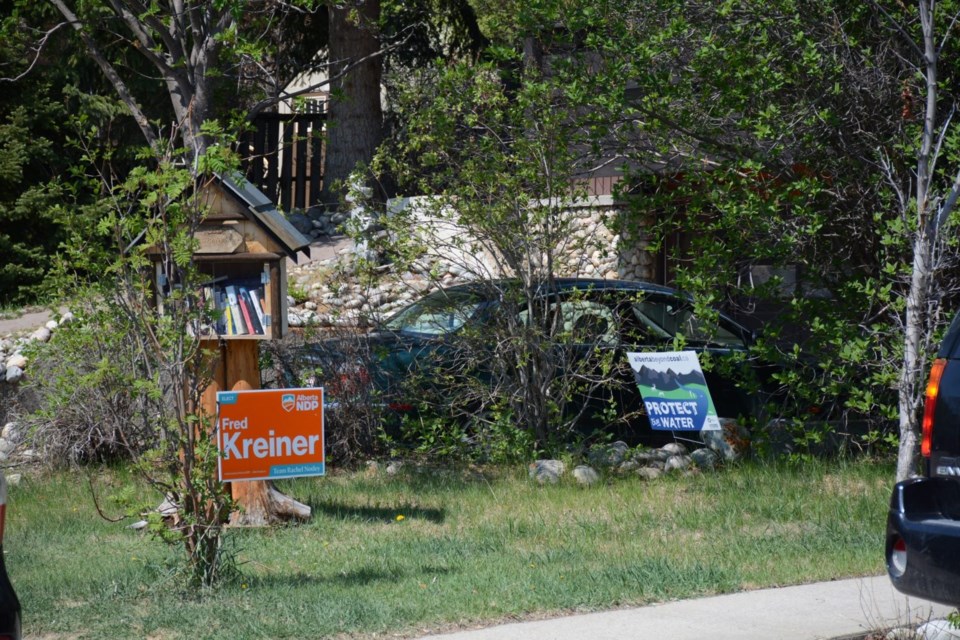Scott Hayes | [email protected]
Local Journalism Initiative Reporter
While AlbertaÔÇÖs provincial election looms just around the corner on May 29, the environment has not yet been a larger subject of public discourse.
While there are 14 provincial political parties registered, there are only two candidates in West Yellowhead: Fred Kreiner of the NDP and incumbent Martin Long of the UCP. 
Requests for direct comments were sent to both parties. Because of election rules, Minister of Environment and Protected Areas Sonya Savage was unable to be interviewed. The request was referred to the UCP campaign office. Neither NDP environmental critic Marlin Schmidt nor the UCP campaign responded to the 51░Á═°ÔÇÖs requests.┬á
Here then is a look at the environmental track records and election promises of both parties.
The NDP held power in the province from 2015 to 2019. Inheriting CanadaÔÇÖs most polluting province, she wasted little time before announcing her governmentÔÇÖs strategy to lower greenhouse gas emissions through a carbon tax, capping oil sand emissions and phasing out coal-fired power plants by 2030. The strategy also included a target to cut methane emissions by 45 per cent by 2025.
Notley also put a great deal of support behind the Trans Mountain pipeline, much to the chagrin of many of her partyÔÇÖs followers. Less than a year after becoming premier, she offered a written submission to the National Energy Board asserting that the pipeline expansion was in the best interests of both Alberta and Canada. The NEB agreed and recommended the projectÔÇÖs approval subject to 157 conditions.
She even pledged $350 million to purchase several thousand rail cars and dozens of locomotives to get AlbertaÔÇÖs oil to the British Columbia coast. The federal government later bought the pipeline and expansion project, and work is still underway
The NDP has yet to provide an for the 2023 election. If the party wins the election, to protect the Rocky Mountains from coal mining through the Eastern Slopes Protection Act.
During the 2023 co-hosted by the Alberta Wilderness Association, Nature Alberta and the Canadian Parks and Wilderness Society on May 12, NDP candidate Kathleen Ganley talked about this promise and her partyÔÇÖs proposed legislative protection for parks. She also touted the NDPÔÇÖs creation of Castle Provincial Park while in power, plus its work to create some of the first Indigenous co-management projects while establishing the largest protected boreal forest in the world.┬á
On what the future might look like under a new NDP government, she spoke of holding industry to task  on abandoned oil wells.
ÔÇťWeÔÇÖve taken a strong stance in favour of the polluter-pay principle. We did see a government policy come forward in the last four years that suggested we should give away this amount of royalty revenues to companies to clean up messes which they are already legally obligated to clean up,ÔÇŁ she said during her opening remarks.
ÔÇťWhen we pit the environment against the economy, we fail on both.ÔÇŁ
During its government from 2019 to the present day, the UCP has developed a record of favouring industry and development over the environment. 
In February 2023, it split Alberta Fish and Wildlife into three ministries, putting fishing and hunting allocations into the Ministry of Forestry, Parks and Tourism. Fish hatcheries management went to the Ministry of Agriculture and Irrigation while fish and wildlife species-at-risk decisions are now the purview of the Ministry of Environment and Protected Areas.
Then, in March, it put two off-highway vehicle groups in charge of the provinceÔÇÖs trail system.
Late last year, it also shuffled management of Alberta Environment and Parks, placing the Forestry, Parks and Tourism Ministry in control of the Provincial Parks Act and the Willmore Wilderness Act. Ecological reserves, heritage rangelands, natural areas and wilderness areas now fall under the Ministry of Environment and Protected Areas.
Nature Alberta catalogued a more complete accounting of
The UCP has published a summary of its record along with its environmental promises on the page of its own website. Among its promises are a caribou recovery effort, an emissions reduction and energy development plan to ensure that Alberta remains a ÔÇťworld leader in responsible, ethical energy productionÔÇŁ and ensuring that Albertans have greater control of how we manage our natural resources and emissions reduction frameworks.
ÔÇťThe UCP is committed to continuing to set our own made-in-Alberta policies to effectively and responsibly manage our environment and natural resources while focusing on the unique needs of Albertans and our industries,ÔÇŁ




